Intro. [Recording date: March 9, 2023.]
Russ Roberts: Today is March 9th, 2023, and my guest is the poet Dana Gioia. He was last here in February of 2021 talking about his book Studying with Miss Bishop. Dana, welcome back to EconTalk.
Dana Gioia: It’s good to be back.
Russ Roberts: Our topic for today is death, mortality, and impermanence. We’re going to look at those topics using a couple of poems from your new collection of poetry, Meet Me at the Lighthouse, and I’m sure we’re going to get into some other topics along the way.
Let’s start with Meet Me at the Lighthouse. That is the book, but it’s also named after one of the poems, and I’d like you to read it and we’ll talk about it.
Dana Gioia: Yeah. Let me show you–this is a picture, actually, of the entrance of the Lighthouse. It is an actual nightclub–a rather shabby one–that’s in Hermosa Beach, California, just outside of Los Angeles. Anybody who is a huge jazz fan will know this nightclub, and this is a poem that takes place there. Everyone in the poem, except me, is dead. I’m talking, actually, to my closest friend, growing up–my cousin, who died at 39. This is a place we went together. So, it’s really a poem to him. I’ll mention a lot of names in the poem: Chet, Cannonball, Stan, Jerry. These are the names of famous jazz musicians: Cannonball Adderley, Chet Baker, Art Pepper. Don’t let them disturb you. The name of the house band at the club was the Lighthouse All-Stars.
Meet me at the Lighthouse in Hermosa Beach,
That shabby nightclub on its foggy pier.
Let’s aim for the summer of ’71,
when all of our friends were young and immortal.I’ll pick up the cover charge, find us a table,
and order a round of their watery drinks.
Let’s savor the smoke of that sinister century,
perfume of tobacco in the tangy salt air.The crowd will be quiet–only ghosts at the bar–
So you, old friend, won’t feel out of place.
You need a night out from that dim subdivision.
Tell Dr. Death you’ll be home before dawn.The club has booked the best talent in Tartarus.
Jerry, Cannonball, Hampton, and Stan,
with Chet and Art, those gorgeous greenhorns–
The swinging-masters of our West Coast soul.Let the All-Stars shine from that jerry-built stage.
Let their high notes shimmer above the cold waves.
Time and the tide are counting the beats.
Death the collector is keeping the tab.
[The above is the poem as printed in the book. As spoken, Gioia substituted “The club” for “The crowd” in the first line of the third stanza and “beat” for “beats” in the last stanza. Note that in this Transcript, as much as possible, we have used printed versions of poems rather than the versions spoken from memory.–Econlib Ed.]
Russ Roberts: That’s really lovely. Now, there was another reference that might be unfamiliar. It was unfamiliar to me. I had a vague idea, but I didn’t know precisely–which is Tartarus.
Dana Gioia: Tartarus. I said, “The club has booked the best talent in Tartarus.” Tartarus is the lowest region of kind of the classical, the Greco-Roman Hell. So, it’s the underworld. I have no idealistic notions of where these jazz musicians have ended up. They’re in the underworld and they’re not even the higher echelon. But, I liked that line: “The club has booked the best talent in Tartarus.”
Russ Roberts: Well, the alliteration ‘talent in Tartarus,’ is nice. Tartarus itself has incredibly–again, I said even though I didn’t know exactly what it was–I knew it was a bad place. I thought it was hell-ishish. It’s funny, it reminds me of Cerberus because–
Dana Gioia: Yeah, well, is Cerberus lives in Tartarus–
Russ Roberts: Yeah. Cerberus is–
Dana Gioia: I think he guards the guards the gate to it.
There’s one other allusion in the poem I should probably point out at. It’s–I love to steal great lines and play with them. And, at this visionary moment in W.B. Yeats’ “Sailing to Byzantium,” where he imagines these holy men and that are kind of in the gold mosaic of a wall, he calls them “The singing masters of our soul.” And so I have “the swinging masters of our West Coast soul.”
Russ Roberts: Well, that’s awesome.
Dana Gioia: But, anyway, I stole part of that line, but I think I made it my own.
Russ Roberts: Yeah, I think that’s fair. I know that poem, but I don’t know it well enough.
Dana Gioia: Yeah, well that’s exactly what I want. I want it to be a kind of faint allusion. I believe that really great poetry just necessarily, unavoidably plays off all the poetry that’s been written. Because if I’m reading you a new poem, you’ve had a lifetime of experience. And so, you take that experience and you just don’t repeat it, but you play with it and you honor the listeners’ lifetime of experience. I’ve got a kind of a novel beat. I’m playing with a different rhythm, but I’m playing with all sorts of things there, because you try to make every line interesting.
Russ Roberts: I will just mention, Dana, that I have the copy–I have your book on my Kindle. While you were reading it, I was following along, and you made a couple of changes, like you did the last time when you read of poem for me.
Dana Gioia: Yeah.
Well, this one actually I probably changed one line–
Russ Roberts: More than that.
Dana Gioia: Do you have-yeah, it could be. It was interesting, I was listening to Bob Dylan last night, a live concert from 1966, and I noticed he played with his lines; and I liked that. I said, ‘That’s what oral performance is.’
Russ Roberts: Sure.
Dana Gioia: But, this is one, I made a couple of adjustments in the last part of the proofs.
Russ Roberts: That’s crazy.
Dana Gioia: But, it’s–an oral text is like jazz. It always has a little bit of room. But, I recited it from memory. The–
Russ Roberts: That’s awesome.
Russ Roberts: Let’s talk a little bit more about the poem and then I want to talk, we’ll move on to talk about death and the challenge of living while knowing that death is in the wings–Dr. Death. So, this was written for your cousin who died young and–
Dana Gioia: Yes. Well, he grew up next door to me. We were in this little enclave of Sicilian immigrants, and we were the two kids that went to college. He actually was a dentist. He got a brain tumor. He had two small kids. But, growing up I saw him every day. We went to the same school, the same church, same high school. We hitchhiked the beach together. So we were like brothers. And, I thought that he needed a night out.
That sounds odd. Let me be really clear about this, Russ. I believe in a metaphysical realm of existence. Now, it could be external or it could be entirely internal, but I believe there’s a continuity between the living and the dead. I pray for my parents. I lost a son, when my first son died. So, I carry the dead with me. I still talk to my mother; and she talks back. I would consider it an impoverishment for me to lose my son, my dad, my mother, my cousin, my many friends. That–it’s odd. It’s very un-American. Americans tend to say, ‘You shouldn’t think about death. Oh, that’s morbid.’ But, I don’t think it is at all. I think it makes my life more interesting.
Russ Roberts: Well, the other motto is, ‘Move on.’ It’s a very strange idea that you should leave behind the people who made you who are, who formed you.
For me, I think–I have a different metaphysical way of thinking about it. It’s: I am my parents. I’m an extension of them, genetically, culturally. As human beings, I think we have a powerful urge for selfhood, and independence, agency, and so on. The idea that we are merely our parents is un-appealing, especially when we’re young; and we spend a lot of time when we’re young trying to get away from them, asserting ourselves and asserting that we are not them.
As I’ve gotten older, I think that’s an illusion. I am them, and my children are me. They don’t like that idea at all, I’m sure. They’re 23 to 30 years old and they assert their independence in all kinds of ways. I love that they do. It’s a beautiful thing. But, the truth is, to quote a line of Kipling, “You can’t get away from the tune that they play.” It’s embedded in you. It’s, again, genetically, and culturally, nature and nurture work together there. I find it actually deeply comforting and moving to think of the generations that way. It’s un-American, it’s out of fashion, but I think–so that’s the way I see it.
Dana Gioia: Yeah, I’m very tribal. But when I think of what poetry is, I think of myself as an artist; and I’m coming into a conversation that has gone on since the beginning of human history. I mean, actually it predates history because poetry predates writing. I come into this conversation which is going on and it’s going to continue on after I’m gone. If I’m a great poet, I can expand the conversation or refine it.
And, I realized after awhile, that’s how I think of life. I’m part of this genetic human continuity that goes back to ancestors I can’t even imagine. But, I did know my grandparents, my parents, and my children. There’s a continuity between life and death, between generations. We see it in genetics and we see it in the personalities and the values and the experiences. So, if you say, ‘Move on,’ I’ll say, ‘Okay, I’ll move on. But, I’m taking them with me.’
Russ Roberts: Yeah; I’ve quoted this before, but I’m going to quote it again because I like it so much. It’s the line from Tom Stoppard’s Arcadia. It says:
We shed as we pick up, like travellers who must carry everything in their arms, and what we let fall will be picked up by those behind. The procession is very long and life is very short. We die on the march. But there is nothing outside the march so nothing can be lost to it. The missing plays of Sophocles will turn up piece by piece, or be written again in another language. Ancient cures for diseases will reveal themselves once more. Mathematical discoveries glimpsed and lost to view will have their time again. You do not suppose, my lady, that if all of Archimedes had been hiding in the great library of Alexandria, we would be at a loss for a corkscrew?
That’s saying something related to what you were saying.
Dana Gioia: Well, at one–it’s in The Real Thing where Stoppard also talks about–he’s thinking about writing, and I think it’s actually even about writing a poem. He’s talking in comparison to, I think, a cricket bat and about how the refinement of the shape and the swing and things like this. That’s what a poet is doing. The reward is to have your words mouthed by children not yet born. That struck me as absolutely the highest honor in poetry–is to have people outside of your narrow time band that see something of value in what you’re doing.
You know, when I was a young, ambitious writer at Stanford and Harvard and imagining how I’d make my mark, I had this very English-department notion of what a poem is, and it’s relationship to the great tradition and the history of ideas. But, nowadays, I think of what a poem is, is this instrument of language that you create, that is one-half a game and one-half a kind of spiritual exploration. But, the highest thing that you can do is to be useful, is to have these words be useful to people in the dilemmas of their actual lives. If you’re lucky, they will find uses for your poem that you don’t even imagine.
But, I had a very odd thing where I wrote a poem and I had people talk about it in a totally different context. And I read the poem, and I realized it applied to that context equally. In fact, I rather liked that as much as I liked my own. Because, poems are like children. Once they’re out of the house, they do things that you didn’t imagine and you may not approve of. But, what you’re trying to do is to make them able to lead independent lives.
I know that sounds very odd, but once my poems are published, I’m simply one of the readers. I probably may be the best-informed reader, but if they belong anywhere at all, they belong in the language, into the readers of the language.
Russ Roberts: You chose this shabby nightclub on a foggy pier. Why did you pick that place to meet your cousin–the ghost of your cousin?
Dana Gioia: What came to me, I was–there was an artist, a very fine artist, and he was collaborating with another artist. They were making this extraordinary book–this huge, large folio[?] of books–with prints of jazz musicians. And, they got the idea that they would ask my brother, Ted Gioa–who was probably at this point, if not the most famous jazz writer in the world, he’s certainly the best-selling jazz writer in the world–if he would write prose and I would write a poem. And I told him, I said, ‘You know, I’ve written one or two poems about jazz, but I can never write a poem that is necessarily any good.’
And I began thinking about it and thinking about it. And then I realized it wasn’t going to be about jazz. It was going to be about a world that jazz created. And my cousin’s ghost came to me, as it were; and I thought about going there to him. And then suddenly the poem became possible, because it was–if the poem doesn’t come out of an inner urgency, and I realized that we had done this together and we had–sort of: Jazz itself was simply part of the total human experience that we had. Once I brought my cousin Phillip into the poem, the whole poem became alive. And, I knew that it was all the ghosts.
If you love music, if you love literature, most of the people you are reading are dead. Most of the people you’re listening to are dead. I just read a novel by Iris Murdoch. I’ve been listening to Arthur Rubinstein play the piano. I’ve been listening to Joan Sutherland sing. These are these people that in some cases I overlapped with their lifetime, and some I might not even have overlapped at all.
And so, once again it’s part of this–there’s a pursuit they have in German University, it’s called Geistesgeschichte–history of the spirit. I always loved that, this notion that you’ve got the history of the visible world, but you’ve got this thing that’s somewhere between the history of ideas and the history of human consciousness that you’re studying. That’s what any artist does, I think, is to live in the history of the spirit, which means that you have to take the things of the spirit seriously.
Russ Roberts: What I was thinking–not when I first read the poem, but talking to you about it–there’s a wonderful idea embedded in the poem, which is: when we think of the people who are no longer with us, if we had a chance to commune with their ghosts in some fashion–and of course we can do it in our imagination; you did meet your cousin at the lighthouse, and can meet him anytime you want. But, when we think about that, you can ask where would you meet your father? Where would you meet your son? Where would you meet your friend, your cousin who is gone? You could even ask the question where would you want your great-grandchildren or great-great-grandchildren to meet you after you are gone?
It’s got me thinking about my own father. Without thinking about it, without pondering it in a conscious way, where I would want to meet him is on a snowy street somewhere, because after a snowfall, he’d want to take what he would call snow walk. And we would walk in the silence of that crunching, the crunching feet in new snow. We’d go in the morning when nobody was out. The cars hadn’t come alive, and the streets hadn’t been cleared, and the snow was still falling. And he loved that. So, it’s not a place for me, I think, right, at least my first thought, it’s an idea–I don’t know. I don’t know what you call it. But it also reminds me that one of his favorite poems was “The First Snowfall,” by James Russell Lowell, which I’m going to find it here. I’m going to read the first paragraph, the first few lines. It’s funny–I’ve written about this. I’ll put a link up to it. But, the opening of the poem is about what it’s like to walk in the snow. It starts like this:
The snow had begun in the gloaming,
And busily all the night
Had been heaping field and highway
With a silence deep and white.Every pine and fir and hemlock
Wore ermine too dear for an earl,
And the poorest twig on the elm-tree
Was ridged inch deep with pearl.
So, my dad would often recite that as we’d be walking along because it was a poem of his childhood. James Russell Lowell wrote in the 19th century. He lived 1819 to 1891, I’m just seeing on the web here. That poem, which I always viewed as a beautiful poem about snow, is actually a poem of tragedy. I encourage readers to read it. It’s an extraordinary piece of emotional power. It’s about–I won’t say what it’s about, but it’s about tragedy.
But, listeners, I encourage you to think about the people in your lives that if you’ve lost a dear one or a loved one, where would you meet them? And I would ask you, Dana, when you wrote this poem–and it’s lovely–but do you spend time there in your head at the Lighthouse with Phillip?
Dana Gioia: I would go out with him. We’d go out to dinner, we’d go out to a club, we’d go to the beach; and the two of us did things together. And so I think of us, not in the gloaming, but in the roaming.
But, when you’re talking about your father quoting the poem–my mother used to quote poems. She was a Mexican American woman of no great education. But, I think poetry did two things. I think it’s exactly the same with your dad, because I think it’s one of the human purposes of poetry. Poetry simultaneously makes us notice things or allows us to see things with fresh eyes. Your father would go out into the snow and he would be able to, in a sense, to see it with a kind of innocence and a kind of freshness. But, also, it allows you to recapture emotions that are somewhat difficult.
It’s taken me a lifetime to understand my family. I think at every age, I thought I understood them; but the older you get, the more insight you got. Both of my parents worked. I used to do housework with my–we were always working, we were always working. Not a bad training for somebody. But my mother and I–we would come in and she’d come in from[?] a job, and we had to clean the house. And, while we cleaned the house, she would often recite poems. Some of the poems I liked, some of them I didn’t. But, I realized–really, it was after her death–that those poems were ways of her being able to reveal emotions, reveal desires, reveal memories that she didn’t really want to go to directly. One of her favorite poems was Annabel Lee:
It was many and many a year ago,
In a kingdom by the sea,
That a maiden there lived whom you may know
By the name of Annabel Lee;
And this maiden she lived with no other thought
Than to love and be loved by me.I was a child and she was a child,
In this kingdom by the sea,
But we loved with a love that was more than love–
I and my Annabel Lee–
With a love that the wingèd seraphs of Heaven
Coveted her and me.
When my mother was reciting this, it was beautiful to me. It put me in a trance. It cast the necessary spell that a poem does of arresting your attention, relaxing your emotions and memories, and creating a special kind of temporary space of heightened feeling and perception.
And that’s what I was lost in. But, what she was really communicating to me was this sadness that she carried about most of her life, from the fact that her mother had died when she was very little, and she had a difficult father, to say the least. And that her favorite brother had died at a very early age–you know about that from Studying with Ms. Bishop in her–and so my mother had these sorrows that she only with difficulty kept under control. This allowed her to vent those things, in a sense, without burdening her kid.
And so, I think that poetry is this secret language of emotion that is very powerful. It’s not an intellectual art, really. People think of it as so intellectual, so difficult. It’s a very everyday magic that allows us to get through the crap we have to get through.
Russ Roberts: Yeah, yeah. It’s beautiful.
Russ Roberts: I think, especially in earlier generations–I don’t know if this is fair to our parents and parents’ parents, but emotion was often repressed, held beneath the surface. I’m sure for my father, poetry for him was a way to connect to his father, who had a sixth grade education, but knew much poetry, and much Shakespeare by heart, and recited it, and loved ideas, and loved books, but had to make a living for his family. So he never got educated.
Dana Gioia: Especially, my Mexican grandfather only went to fourth grade. I asked him why he had to quit. He said, ‘Well, when my father was murdered, my brother and I had to become cowboys.’ They were in Lost Cabin, Wyoming. I wrote a poem about this in the book called “The Ballad of Jesus Ortiz.” But, he was a cowboy, a Mexican cowboy with a fourth grade education, sort of bilingual. And, he knew dozens of poems by heart, because cowboys would sit around the fire and they would recite poems. They would sing songs, and they would tell stories.
And so, I look at this thing, and that’s why I have never believed what I was taught at Stanford and Harvard, that poetry was an elite, intellectual form of language. It can be that, because poetry simply is a special way of using words so that they are heard and read in a special way. And you can do anything you want in poetry. But, the bulk of great poems have been works that are pretty accessible to any alert, intelligent person, which I think is a substantial amount of humanity.
It was sort of funny–as you know, I wrote, years ago, an article called, “Can Poetry Matter?” It was published in the Atlantic Monthly. And to the astonishment of everyone, including myself, it generated more mail than any article in the history of the Atlantic Monthly. And they didn’t even put it on the cover. But it got hundreds and hundreds–and this is when people actually had to write letters.
And there was many of them that were there, but my favorite of all the letters–that came from people in the military, everything else-was a woman who was on a ranch. She said that she had three sons and poetry was always important to her. And she sacrificed a lot to get her kids educated, and it disappointed her that poetry didn’t really matter to any of her sons. Then she said–the thing that really struck me, she goes–she’s always loved poems and she knows many by heart. She goes, ‘Some days I stand at the sink, and a poem is the only thing that gets me through the day.’ I just love that image, because our sorrows tend to come in the ordinary moments of our lives. Poetry is a kind of magic to turn a sorrow into a memory–a memory of value–or, a sorrow that triggers, and you can recapture the emotions that led you to that person or whatever. But, I do–that person or that place–to your own mortality.
Russ Roberts: I do think–when we think about what we didn’t pass on to our children, which I think about from time to time, I did not expose my children to much opera. I love opera: opera is a huge part of my emotional life. Yet, for a variety of reasons, it just didn’t become important. And I think about it. It’s interesting: I knew some opera when I was younger, say, before I went off to college. And my dad would harangue me to listen to more opera after I got out of college. I just found it tedious and not interesting. He sent me at one point a cassette of Leontyne Price singing Madame Butterfly, and I got hooked. I got totally–
Dana Gioia: Puccini will do it.
Russ Roberts: Yeah, he cheats. So, if you’re out there listening and you’re not an opera fan, or you’ve never been exposed to it, you can start with La Bohème or Madame Butterfly, and you can actually listen to it profitably without a libretto, without the words. Just close your eyes and listen to a great voice.
Dana Gioia: I have two sons, and the older one I used to take to the opera all the time, because I was a reviewer at that point, music reviewer. My wife, she’d like to go once or twice a season. And so I’d take my son, and he loved going because he was going to San Francisco or to Washington or into New York, and we’d have a very nice dinner and we’d do it. He doesn’t listen to opera. The younger one, who I never took, he likes opera. So, maybe there was some osmosis there.
Russ Roberts: There’s a–nah, I think it’s–
Dana Gioia: But, I fell in love–I loved classical music, but I didn’t like opera because I think it was the language barrier and the period barrier. I was actually a student in Vienna, and there was an American girl who was also there, and I think Sue had a crush on me, and she was an attractive girl, but a little difficult, I thought. She said she wanted to buy tickets to La Bohème. And we went, and I think she was assuming that we would go to the opera and fall in love. And I did fall into love, but with Puccini. I listened to La Bohème, and it was like, ‘Where has this been all my life?’
Then I started going standing room to the opera. I sat with Sue, and I began to go once a week, twice a week. By the time I was ending the Vienna, I was going three or four nights a week, because you could do standing room for 60 cents. I developed a bankruptingly expensive habit for the United States, which is one of the reasons why I’m glad I was a reviewer and later the chairman of the National Endowment for the Arts, because they gave me great tickets for free.
Russ Roberts: Well, what I was going to argue, I was going to claim–and that opera thing was a digression for me–is I think for most modern listeners, most people listening to this conversation, our poets have been replaced by our songwriters. It is songs that we sing at the sink rather than poems that we recite at the sink. Because of the extraordinary time we live in, there are many challenges about living in this time. But, one of the greatest things about this time is the extraordinary richness of music that we have available to us, for close to free.
Well, in the old days, if you wanted to relive your youth, you’d have to take out an LP [Long Play–a large vinyl record], if you had it, and play it. It might be scratched and it might be broken and gone. But, today you can access all the songs of your youth instantly; and they can make me cry. I can hear songs from my adolescence or my twenties, and there’s so much emotion that I [?] felt at the time when I was listening to those songs in real time that I still tap into that. There’s a sense of loss, there’s a sense of sometimes fulfillment, a sense of the power of youth that’s now–
Dana Gioia: Now, Russ, you probably think you’re going off-topic, but you’re not, because poetry and song, were the same art. If you go back to Latin, what’s the word for poem? It’s carmen like the name of the operatic title character. A carmen is a song, it’s a poem, it’s a magic spell, and it’s a prophecy. That’s because they’re all interrelated. The prophets were poets. You look at the prophetic books of the Old Testament, they’re in verse, because verse is the medium–poetry is the medium for prophecy. [More to come, 35:18]
















